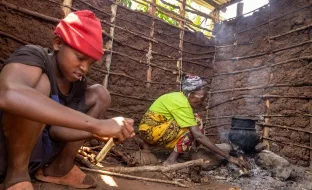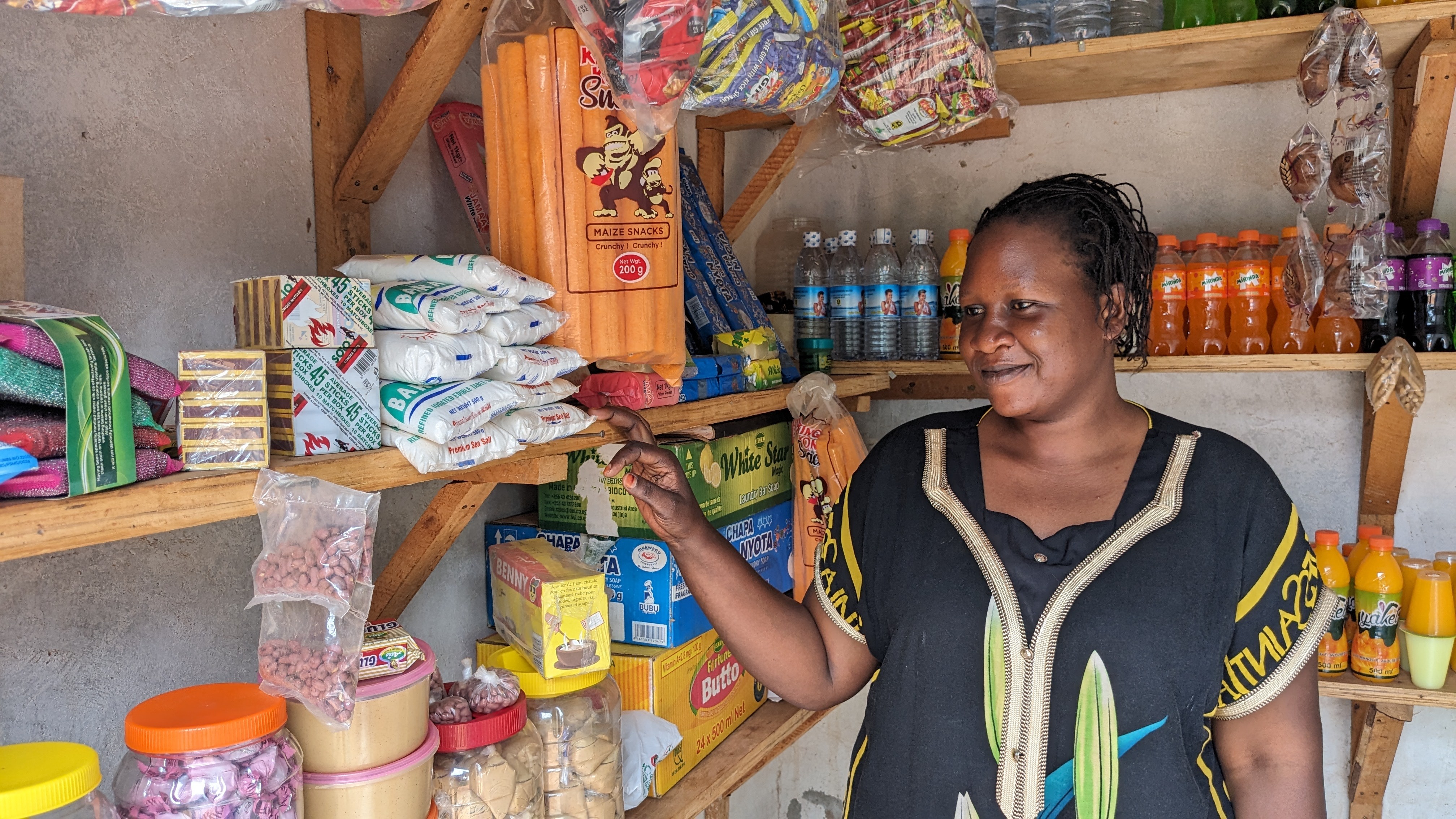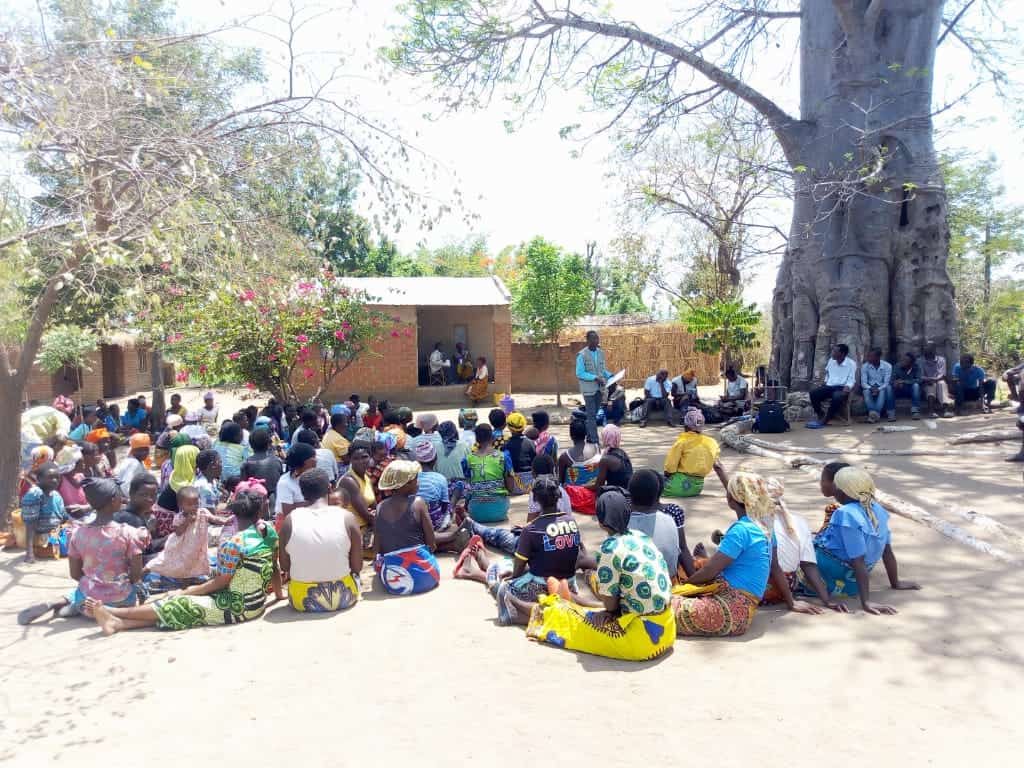Recently, a village of about 70 households in the Chiradzulu district of Malawi was selected to receive GiveDirectly transfers. But when GiveDirectly field officers motorbiked to the village one weekday morning to hold a routine “baraza” — an introductory community meeting where GiveDirectly explains its work and invites households to either opt in or out of transfers — the field officers were first actively ignored, and then aggressively asked to leave.
Later, the village chief visited the GiveDirectly offices to ask us to return.
We spoke with two recipients in the village; the village chief; a GiveDirectly field officer (FO); and a GiveDirectly associate field manager (AFM) to find out what happened in that village in Chiradzulu — and what GiveDirectly can learn as an organization from the bizarre baraza.
A missing chief
When GiveDirectly identifies an eligible village to target with cash transfers in Malawi, the process that follows is:
- GiveDirectly reaches out to the village chief to introduce our cash transfer program — and explain that we would like to deliver cash to every household in the village.
- Assuming the village chief accepts, GiveDirectly holds a baraza to explain our work to everyone who lives in the village and answer any questions people have.
- After the baraza, GiveDirectly immediately kicks off the enrollment process: census, registration, audit, payment, and follow-up.
Doreen was one of three field officers who was tasked with holding the baraza in the village in Chiradzulu. She said the village was quite far — it took 40 minutes off the main road by motorbike to get to the village.
“On the day we arrived at the village for the baraza, we found everyone was gathered,” Doreen said. “But no one seemed to acknowledge our presence, and no one welcomed us. We called over a nearby kid and asked, ‘Where’s the chief?’ It turned out that the chief was not there on this particular day.”
Doreen called the associate field manager, Dingaan, on her cell phone to inform him that the chief was not there.
“That was the first alarming thing,” Dingaan told us. “That the chief wasn’t there.”
Dingaan called the village chief, and she told him that she couldn’t make it because she has a business in Limbe (out of town) and was attending to her work there. She said that they should just go ahead with the baraza without her. So Dingaan relayed the message to Doreen, who kicked off the baraza with the two other GiveDirectly field officers who were there that day, Ethel and Dumera.
“There was some tense feeling,” Doreen said, but her colleague Ethel began the baraza anyhow.
An incomplete list
As Ethel explained how GiveDirectly works to everyone in the village, Doreen worked on verifying a list of all the households in the village with the help of two men from the village. The list had been provided by the village chief, and it was Doreen’s job during the baraza to make sure the list fit GiveDirectly’s criteria before the baraza was over, at which point the field team would start census, verifying the list door-to-door. But as Doreen went over the list with the two men, it became clear that there were some people who were not included on the list.
“Most of the houses in the village fell during the rains,” Doreen told us. “So some people had moved in with their relatives. But the list just gave us the name of the owner of the house, and not of the other family that moved in.”
It isn’t unusual for the initial list to need some editing. But quickly, word spread through the crowd that not everyone was included on the list and this caused some instant commotion.
“We continued with the baraza,” Doreen said, “but the community started making a lot of noise and the baraza became pointless. They were not listening to what message we had come to give them, they were just concerned about the list. So Ethel cut the baraza short.”
Doreen and Ethel then tried to explain that no one would be left off the list.
“We told them that, as an organization, the way we work, we do not leave any household out,” Doreen said.
But the community remained unconvinced, worried that the incomplete list meant some families would benefit, while others would not.
“That’s when all chaos broke loose,” Doreen said. “People crowded around us — and some were saying ‘go’ and some were saying ‘stay!’” The village didn’t want anything to do with GiveDirectly if some people got transfers and others did not. No matter what Doreen, Ethel, and Dumera said, they weren’t able to convince the village that the list would be amended fairly to include every household.
One of the recipients, Fione, told us later that she was one of the few people who was not shouting at GiveDirectly to leave.
“I had wanted your staff to not leave,” Fione said, “but because the chief was not there, it was hard for us, and we were overpowered. But if the chief was around then all this would not have happened; everything would have ran smoothly.”
In the end, Doreen, Ethel, and Dumera called the associate field manager again, Dingaan, and told him they had lost control of the baraza. He told them to get back on their motorbikes and return to the office.
“Honestly speaking, I was scared,” Doreen said. “I’ve never felt so unsafe at work than at that particular moment. Later, when I looked back, I actually felt sorry because I knew the cash transfers would be impactful and life-changing, but we weren’t able to get our message through.”
Another botched baraza
Two days later, the team motorbiked back to the village to meet with the chief.
Dingaan explained what had happened during the baraza and the village chief — Chief Christina — apologized and agreed to explain GiveDirectly’s work to the community herself, in the hopes of persuading the village to accept the transfers. If (after hearing about GiveDirectly from Chief Christina) the village wanted GiveDirectly to return, Dingaan promised that the field team would come back to conduct a second baraza.
Later, the chief called Dingaan and asked GiveDirectly to return. The village, she said, was on board.
So Dingaan, Doreen, Ethel, and Dumera returned. But this time, when they showed up for the baraza, there were only five women present in addition to Chief Christina. The team waited an hour for people to show up, but no one did.
“The chief said she didn’t know where the people were,” Dingaan told us, “and that we should just wait because people wanted to be a part of the program. So we waited another hour.”
Eventually the GiveDirectly team left because nobody came — and we require at least 70% of a village to be present in order to hold an introductory baraza.
A surprise visit
After two attempts at holding the baraza, the field team decided to wait before trying again.
“We decided we should just come back later because now everytime we were coming back to this village we were changing our schedule and were delayed with other villages,” Dingaan said. Each set-back meant a hit to efficiency, on which GiveDirectly is not willing to sacrifice.
But then the village chief paid a surprise visit to the GiveDirectly offices.
“The chief came to our offices begging for forgiveness and said the people were very sorry,” Dingaan recalled. Since the last attempted baraza, cash transfers had gone out to other villages in this particular area. “The chief had seen how the program helped the people in another nearby village,” Dingaan said.
Chief Christina pleaded with the team to come back and enroll everyone in the village.
“I tried telling them to at least enroll me,” the chief told us later, “but I was told that GiveDirectly does not work like that.”
While it’s true that we won’t selectively enroll individuals, GiveDirectly’s Malawi country director, Genevieve, said that we did consider it in this case, very briefly.
“We thought that maybe if we enrolled her then the rest of the village would follow,” Genevieve said. “But there are reasons GiveDirectly doesn’t practice this kind of selective enrollment. For example, what if we enrolled her, and then something happened to her? We’ve actually seen this before: a chief died right before we enrolled a different village and everyone told them they were cursed.”
So for the third time, the field team hopped onto motorbikes and rode the familiar road to the village, where, this time, they found a full baraza.
“The mood was very different,” Dingaan said. “The whole village was there; everyone was dancing and welcoming us as if nothing weird had ever happened before.”
A chief learning (and two others)
GiveDirectly has been running barazas in the communities in which we work for many years — and yet this incident proves we still continue to learn how to do them better. Out of this experience, the Malawi field team emerged with three learnings:
- The chief must be present at the baraza.
This incident proved how truly imperative it is that the village chief is in attendance. If GiveDirectly had insisted that Chief Christina needed to be present at the baraza, she might have been able to act as a mediator to the dispute earlier on, rather than helping to mend the misunderstanding retroactively. While the GiveDirectly field team has always preferred that village leadership is present at a baraza, the previous policy was that, if the field team arrived and the chief was not there for some reason, GiveDirectly would move ahead with the baraza anyhow, as not doing so would mean a significant loss of time, requiring the team to reorganize the baraza entirely. Since this incident, however, the Malawi team has made it a policy to proceed with a baraza only if the chief is present, as we have seen that making this trade-off up front will save us time and resources in the long run. - Stress our targeting criteria earlier on in the baraza.
Many NGOs that work in Malawi only pick a small number of households or families in a village to target, and initially the village involved in this incident was not aware of GiveDirectly’s policy of saturation. This is why the community was riled up by the incomplete list. By explaining our saturation model up front during a baraza, we can differentiate ourselves from other organizations that distribute aid differently, and proactively quell any fears of a list containing errors: if the first draft of a list is inaccurate, we will modify it to include all households. - Stay flexible during barazas.
While it is important to make sure all the talking points are covered at every baraza, going forward we’re empowering our field officers to respond to each situation as it arises. In this particular case, the Malawi FOs believe that if they’d stopped earlier and taken questions (which normally happens at the very end of a baraza) rather than plowing through the 45-minute presentation first, they might have been able to de-escalate the situation sooner.
It is imperative to GiveDirectly that, as an organization, we strive for the highest possible efficiency. This often means staying humble in our operational proceedings, recognizing that there are always new lessons to learn that can, across all our programming, improve our processes to scale our broader impact as an organization.
This project is made possible by Good Ventures, and the generous support of the American people through USAID. The contents of this blog are the responsibility of GiveDirectly, and do not necessarily reflect the views of USAID or the United States Government.



